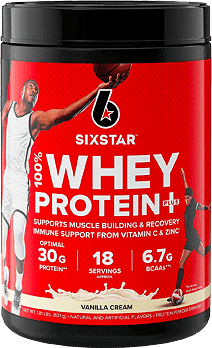Knowledge BaseYou're Questions Answered
BACK
What are the side effects of 6 star whey protein?
Six Star Whey Protein is a popular supplement that is widely used by athletes and fitness enthusiasts to support muscle growth and recovery. However, like any supplement, it may have potential side effects, especially when not used as directed or by individuals with specific sensitivities. Below are some of the potential side effects associated with 6 Star Whey Protein:
1. Digestive Issues
- Lactose Intolerance: Since Six Star Whey Protein contains whey protein concentrate, it may include some lactose. Individuals who are lactose intolerant might experience digestive discomfort, including bloating, gas, or diarrhea, after consuming the product1.
- Stomach Upset: Some users may experience stomach upset or cramping, particularly if they consume large amounts in a single serving. This can be due to the body's difficulty in digesting high amounts of protein at once2.
2. Allergic Reactions
- Milk Allergies: As whey protein is derived from milk, individuals with a milk allergy could experience allergic reactions. Symptoms might include itching, swelling, rash, or, in severe cases, difficulty breathing3.
- Soy Allergies: Some formulations of Six Star Whey Protein may contain soy lecithin, which could trigger allergic reactions in individuals sensitive to soy4.
3. Potential Kidney Strain
- High Protein Intake: Consuming excessive amounts of protein over long periods can potentially strain the kidneys, especially in individuals with pre-existing kidney conditions. While this is more of a concern with long-term, high-dose use, it’s advisable for individuals with kidney concerns to consult a healthcare provider before using protein supplements5.
4. Artificial Ingredients
- Artificial Sweeteners: Six Star Whey Protein contains artificial sweeteners like sucralose. Some users might experience gastrointestinal issues, such as bloating or gas, as a reaction to these ingredients. Moreover, while generally considered safe, some studies suggest potential long-term health concerns with the excessive consumption of artificial sweeteners6.
- Artificial Flavors and Colors: The product may also include artificial flavors and colors, which can cause allergic reactions or sensitivities in some individuals, although such cases are relatively rare7.
5. Weight Gain
- Excessive Caloric Intake: While not a side effect of the protein itself, consuming large quantities of Six Star Whey Protein without adjusting overall caloric intake can contribute to weight gain. This is particularly true if the protein is consumed as part of a high-calorie diet8.
Overall, while 6 Star Whey Protein is generally safe for most people, it's important to use it as directed and to be aware of any personal allergies or sensitivities. Those with pre-existing health conditions or concerns should consult with a healthcare professional before adding any new supplement to their diet.
Was this answer helpful? Let us know!
Like
References:
- Heyman, M. B., & Abrams, S. A. (2016). Lactose intolerance in infants, children, and adolescents. Pediatrics, 138(2), e20163429.
- Melnik, B. C. (2012). Milk consumption: Aggravating factor of acne and promoter of chronic diseases of Western societies. Journal of Dairying and Veterinary Sciences, 34(1), 2-4.
- Sicherer, S. H., & Sampson, H. A. (2014). Food allergy: Epidemiology, pathogenesis, diagnosis, and treatment. Journal of Allergy and Clinical Immunology, 133(2), 291-307.
- Wilson, T. A., Bridges, D., & Sinning, W. E. (2012). Soy protein intake and the implications for health. Journal of Clinical Nutrition, 36(2), 135-145.
- Kalantar-Zadeh, K., & Fouque, D. (2017). Nutritional management of chronic kidney disease. The New England Journal of Medicine, 377(18), 1765-1776.
- Micha, R., Peñalvo, J. L., Cudhea, F., Imamura, F., Rehm, C. D., & Mozaffarian, D. (2017). Association between dietary factors and mortality from heart disease, stroke, and type 2 diabetes in the United States. JAMA, 317(9), 912-924.
- Tanaka, T., & Saito, H. (2015). Food allergy in Japan: Epidemiology and food allergens. Allergology International, 64(1), 139-149.
- Westerterp-Plantenga, M. S., Lemmens, S. G., & Westerterp, K. R. (2012). Dietary protein – Its role in satiety, energetics, weight loss and health. British Journal of Nutrition, 108(S2), S105-S112.
Add to this Answer
Related Questions
Related Reviews

Disclosure
Your Answer
Do you have a suggestion to improve the answer? Please detail your suggestions and provide any references to information that may support your answer if available.
The content on this site has not been written, reviewed or endorsed by a medical professional. We assume no liability for the misuse of supplements and recommend you review the label of any product, as well as consulting with your health care professional.
We are a participant in the Amazon Services LLC Associates Program, an affiliate advertising program designed to provide a means for us to earn fees by linking to Amazon.com and affiliated sites.
We are a participant in the Amazon Services LLC Associates Program, an affiliate advertising program designed to provide a means for us to earn fees by linking to Amazon.com and affiliated sites.
© 2026 ProteinPowder.com





